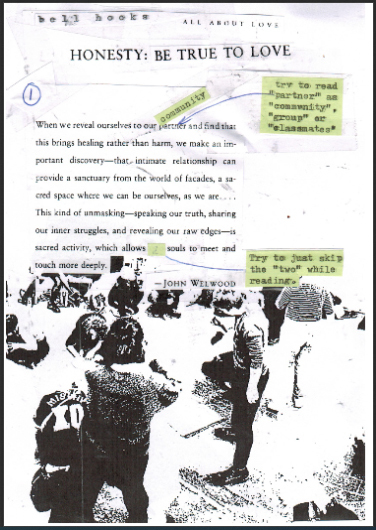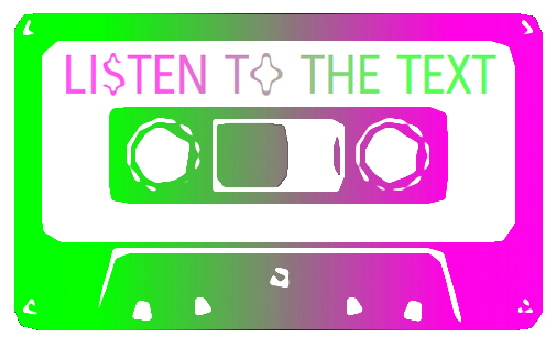
Can showing your emotions in the classroom be helpful?
 Collage Åke Sjöberg, 2021
Collage Åke Sjöberg, 2021
Or will doing so only make you appear unprofessional?
 bell hooks (2018) p. 53
bell hooks (2018) p. 53
 Åke Sjöberg, 2021
Åke Sjöberg, 2021
A short story
...of how the idea for this text-collage has developed. It all started during the first TTTT workshop "How to say it" at erg art academy in Brussels 2020. During this week-long workshop, forty or so students (participants) and staff (organizers) took part in activities, lectures, workshops and small group discussions.
We developed and used a system of feedback and evaluation at the end of each day. Through the feedback and evaluation a lot of frustration and critique came from the participants, saying that the organizers of the workshop wasn't creating a space that was critical enough and that many structures and hierarchies were still reproduced within the workshop. There was also other feedback in the evaluation concerning problems with the classrooms used for many of the activities, that it had bad acoustics and a noisy coffee machine was used in the classroom making it even worse.
Situating the “I” in the text
The way this text-collage came to be, and the position it is curated from:
My name is Åke Sjöberg. I am a cis-male artist and researcher. In the fall of 2019, I was a second year Master student in fine arts at Valand Academy (today called HDK-Valand). One of the reasons why I two years earlier had applied to this particular education was a project I had read about called “LET'S MOBILISE: what is feminist pedagogy”. From what I read about this project I understood it as an “activist art project” inside Valand Academy.
I had taken an interest in ”Intersectional feminism” as a perspective that views several overlapping power-regimes that together impact us.
I've grown up in a Swedish rural working class family in which neurodivergence and mental health problems were present. I have also for 20 years struggled with my own anxiety, depression and social anxiety problems, and I'm also father to a neurodivergent child, and partner to a wonderful bipolar person. This is the position "I" speak from.
The “we” of the text relates to the TTTT organisation, “we” can also relate to you and me, the writer and the reader.
This text-collage is curated from one single position, my position as Åke Sjöberg, but just like a curated exhibition consisting of several artists work it strive for a pluralist perspective. An exploration consisting of several different inquiries that examines a common question or a common field. This “text” is not written by me, and I'm not the Author of it, rather I am the observer of social interaction, the facilitator of conversations, and the curator of a text-collage.
 Sjöberg (2021)
Sjöberg (2021)
The group at the workshop became, as I understood it quite polarized, where the participants, on the one hand criticized the organizers for their work, and the organizers had to organize activities and facilitate in an atmosphere of growing discontent and pressure. Finally one of the organizers broke down in tears, and explained to the entire group that she and the other organizers were trying to create a good workshop and a good inclusive environment, but under a lot of pressure and with poor resources and facilities. “We don't even have a f***ing cafeteria, we have to have the coffee machine in here” they said. She also explained about the pressure “from above”, that the organizers had, toward the funding body, to produce results in the form of “Intellectual Outputs”. After this first performance of emotional honesty the polarization was decreased a bit.
Some days later a second organizer was under pressure and started crying and told about the pressured situation they were under, and what happened “behind the scenes”, what “Intellectual Outputs” the entire TTTT organisation had to produce. And that these “Intellectual Outputs” was something that the entire group had to take into consideration, when reflecting over the activities and “production” of knowledge, the artistic tools and documentation that had to be part of the project. But that if we all could understand that some of the activities within the TTTT organisation had to be used to produce “Intellectual Outputs”, that were in accordance with the original funding application, we could also use the workshop and the TTTT organisation for activities that were creating other outcomes harder to measure and assess.
 Sjöberg (2021)
Sjöberg (2021)
And after these two occasions of (what I have chosen to call) “Radical Emotional Honesty”, I perceived the group as less divided and polarized. That there was an understanding that we are in this together and that the organizers could share more of their information and their power. That there were things we had to produce and that there were things we could decide together. This shift I believe happened because two of the organizers were “radically emotionally honest”, and I wanted to use the tttt-organisation to produce more knowledge about how honesty can be used as a feminist tool.
The workshop
In the second TTTT workshop in Gothenburg (June 2020) I facilitated a workshop where participants read Chapter 3 “Honesty be true to Love”, from bell hooks' book All About Love, a text about the importance of honesty in building healthy love relations.
The participants were divided into small groups, and started by reading the text together out loud, one paragraph each. They were given the instructions to try to replace “one's partner” of the text, as the object of love, with one's community. After reading they had a conversation about it. You can read the transcriptions of those conversations below.
The text was slightly shortened and distributed as a fanzine-like booklet. A PDF version of the booklet can be accessed here
Literature
There are several parts of "Radical Emotional Honesty as a Feminist Tool", that have been explored by different authors and researchers. And this text-collage is an attempt of taking knowledge from closely related fields, such as the importance of honesty in building love-relations, and translating it to another context, the community-relations in classrooms, activist spaces or workplaces. The method of taking feminine coded knowledge, about building personal relations and applying it to professional relations in masculine coded spaces such as classrooms, workplace or activist meetings is a deliberate choice. 1
And like in the reading of the first text, by bell hooks, where we read the "Love for one's partner", as "the Love for one's community", several other literature sources relating to the importance of honesty in personal relations have been used, and read in a similar way. I do this with the understanding of that “feminist pedagogy” can be created by introducing aspects, methods and tools from the private sphere, (of private, loving and family relations) , into the public sphere of classrooms and workplace, that have traditionally been male separatist spaces, where showing emotions and creating relations based on love an honesty were seen as unprofessional.
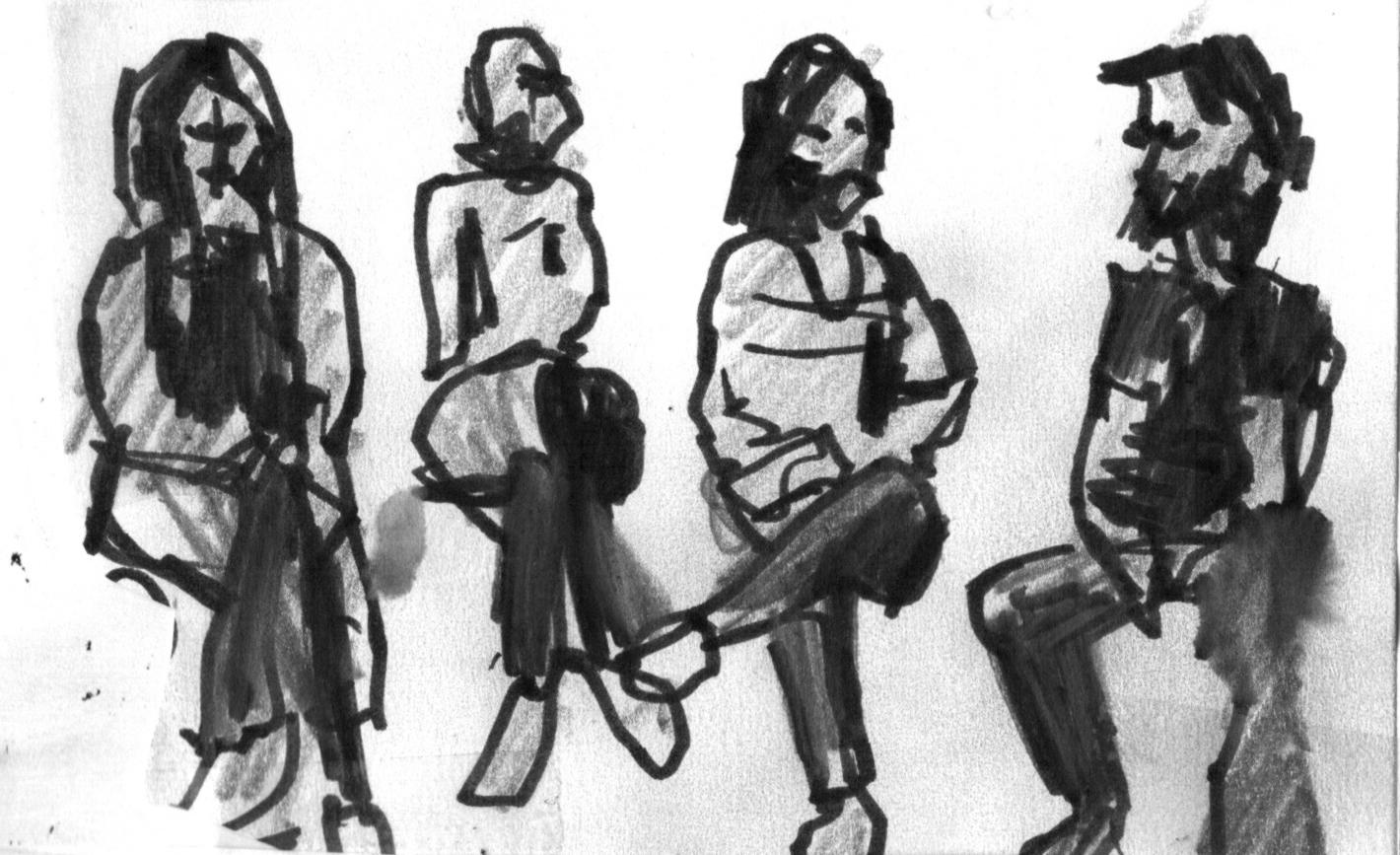 Drawing by Åke Sjöberg 2021
Drawing by Åke Sjöberg 2021
Some texts, books and chapters that might be interesting in relation to Radical Emotional Honesty as an Feminist Tool. At the bottom of the text you can find information and links to the books mentioned.
 Sjöberg (2021)
Sjöberg (2021)
In chapter 16 Embracing Conflict from Janet W. Hardy and Dossie Easton's book the Ethical Slut we are introduced to the idea of Win-win situations, achieved when conflicts are resolved using honest communication about one's emotions and needs. They also introduce I-Messages where they explain how good communication is achieved when people start by telling about their emotions. Start by saying “I feel”, that then must be followed by an emotion. In order for this method to work, “I feel” can not be followed by anything other than an emotion, such as “I feel we should...” or "I feel you are...".
 Sjöberg (2021)
Sjöberg (2021)
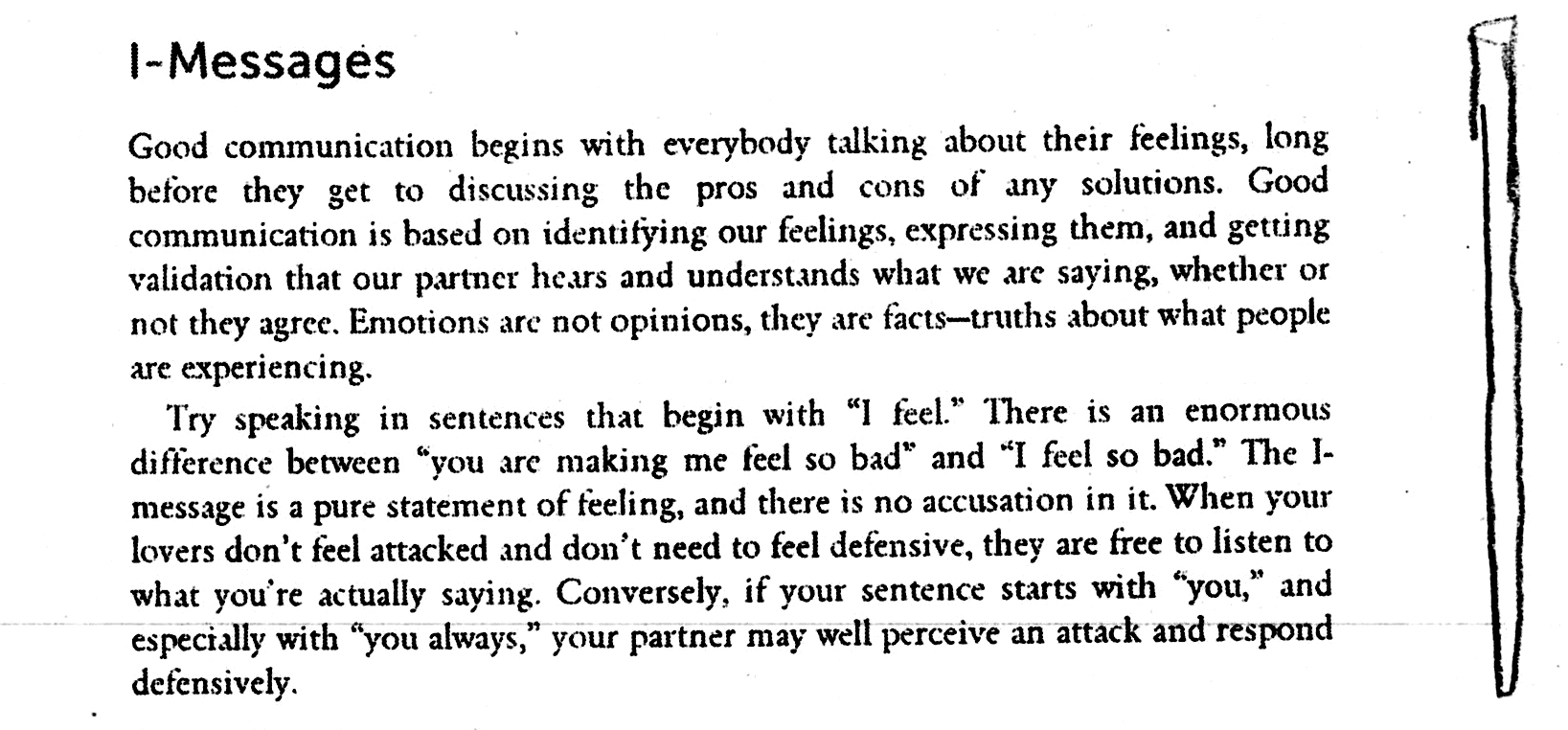 Hardy, Easton (2017) p. 155
Hardy, Easton (2017) p. 155
More knowledge about honesty can be found in chapter 4 Levels of telling the truth in Brad Blanton's book Radical Honesty. The psychotherapist tells about three levels of honesty. The first is telling the truth about information, the second is to tell about the emotions and motivations behind one's actions, and the third is a level where one “lives truthfully”, by not thinking about how one and one's actions is received by other people, but still being empathetic, because one trusts one's own true empathy.
From the text that inspired this text-collage: chapter 3 Honesty be true to Love, from the book All about Love by bell hooks. Here the author describes the importance of being honest, if one is going to be able to build loving relations. I believe these methods can also work in creating an atmosphere of love in a small community or a classroom.
 Blanton (1997) p. 47
Blanton (1997) p. 47
Group conversation, Part 1
In the TTTT workshop “Radical Emotional Honesty as a Feminist Tool”, two small groups talked about honesty and lies. This after a collective aloud reading of the chapter Honesty be true to Love from the book All About Love by bell hooks. These are transcripts of those conversations.
 Collage by Åke Sjöberg 2021
Collage by Åke Sjöberg 2021
Group 2: Aroun, Zoya, André
Preparing to record. I'll just check my Dropbox to see if it's working. Probably it will only be accessible at the end of the recording. Yes, I just wanted to see. Okay, it's working.
– Okay, great, who wants to start?
– I can start:
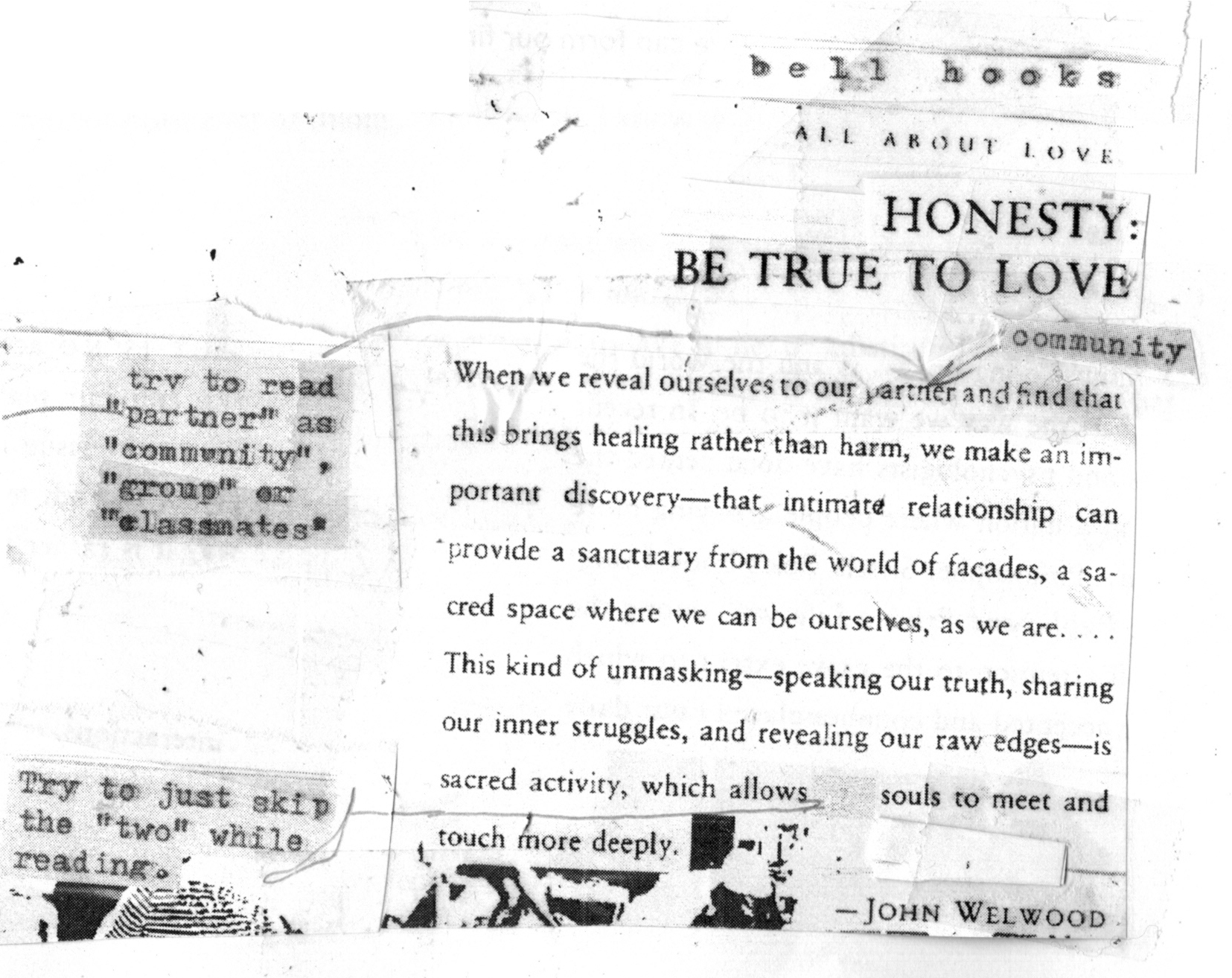 Page 1 from the booklet, Sjöberg 2020 made with hooks (2017) p. 41
Page 1 from the booklet, Sjöberg 2020 made with hooks (2017) p. 41
– Thank you for reading.
– Well, wow.
– Yeah, it's a great book.
– Did you read it, André?
– Yes, I did.
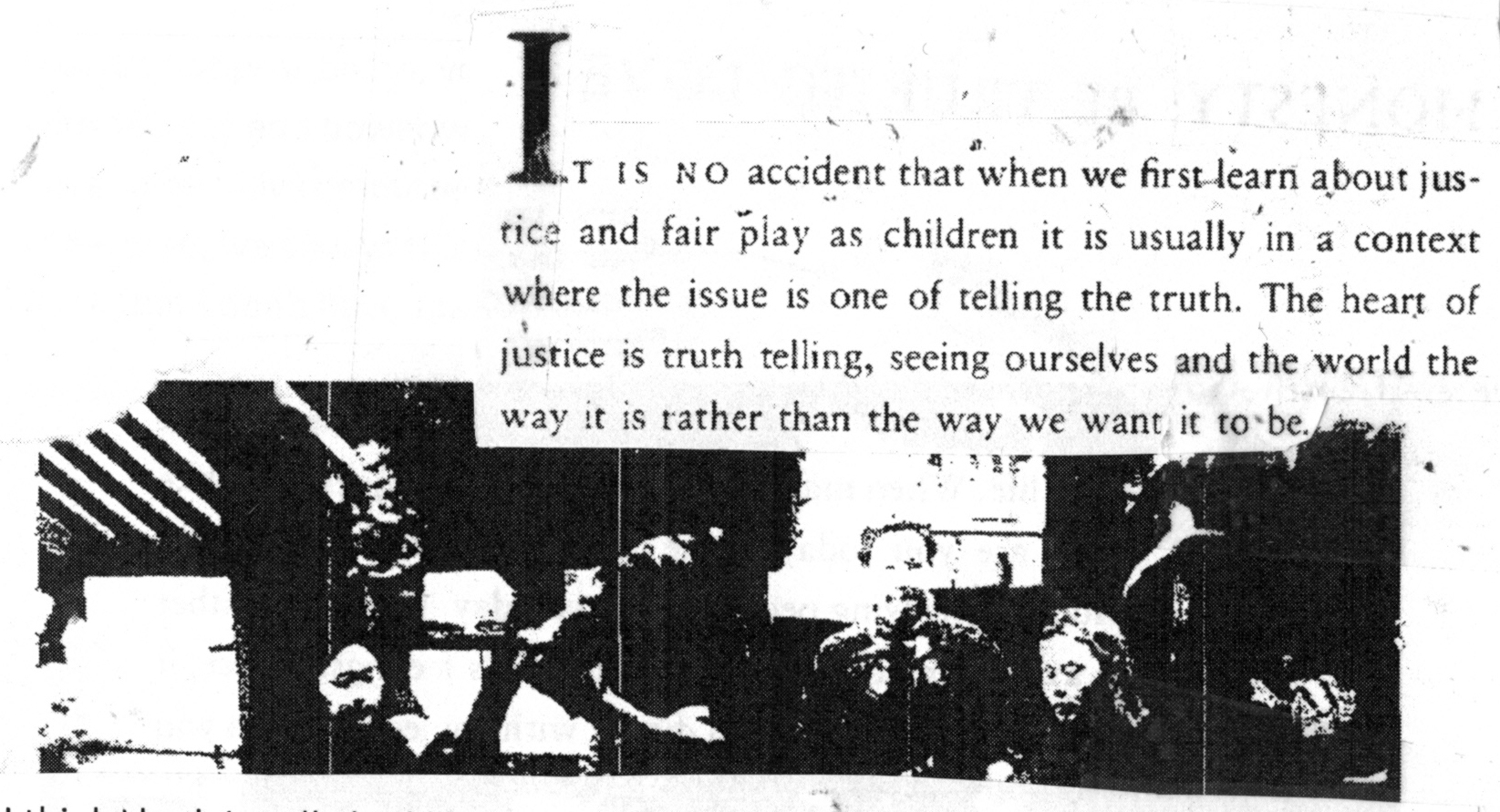 Page 4 from the booklet, Sjöberg 2020 made with hooks (2017) p. 41
Page 4 from the booklet, Sjöberg 2020 made with hooks (2017) p. 41
I think I had, I really had like insights while reading the excerpts and listening to you. And at the same time. I don't know, I'm like, something in myself creates resistance, because, because there is this idea of transparency in the society.
 Page 4 from the booklet, Sjöberg 2020 made with hooks (2017) p. 41
Page 4 from the booklet, Sjöberg 2020 made with hooks (2017) p. 41
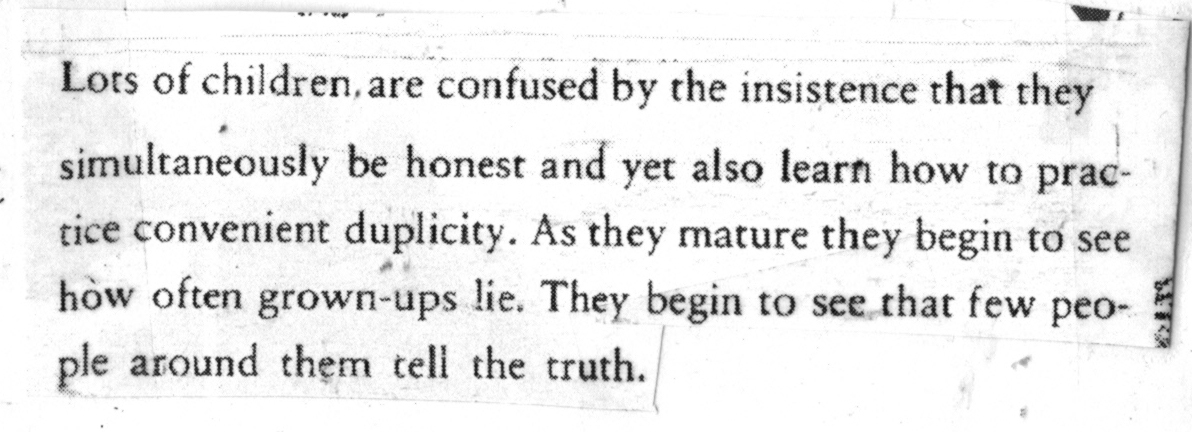 hooks (2017) p. 42
hooks (2017) p. 42
Is it when you set a secret space for yourself? Like there's two different things you can have. But not, with it being about power and hiding things to the other people you're in contact with.
I think that that's really the thing, being honest and just living your life as you should, and as you do. And with your privacy and all that, because like it's totally normal to be living on your own and just doing stuff by yourself. But also, it's really about hiding, some things and I think when you hide feelings for too long, for example, it creates conflicts, and it could be, the people around and you what you're feeling to just talk about it and not make it to that point where you hide things and you can say things. And just it's blocking out a lot of things, I think, yeah, I know what you're thinking about it.
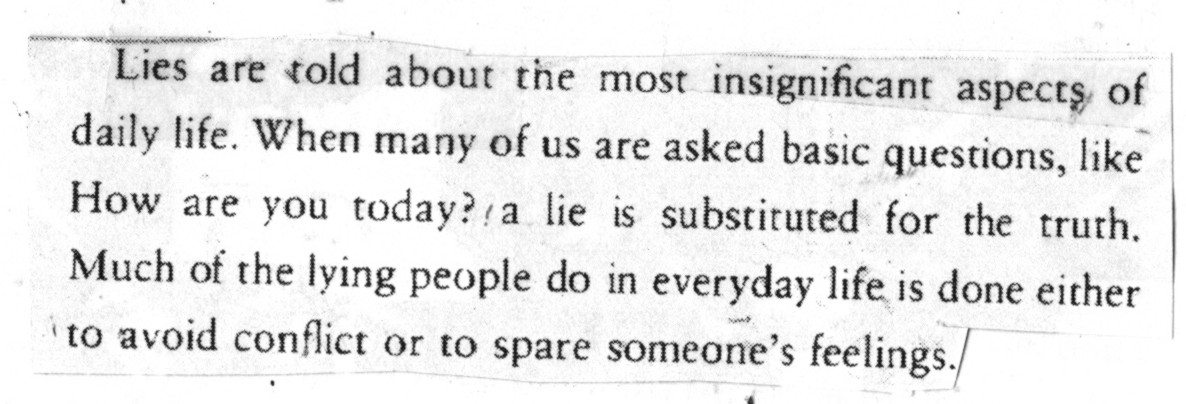 hooks (2017) p. 42
hooks (2017) p. 42
I was thinking more now that you were speaking about it and I think what is really interesting is that, because there is this logic of secrecy, of keeping things flying or keeping secrets to gain power, to gain some sort of advantage. That destroys the possibility of a more spiritual interiority.
…you should also be telling the truth when you say: 'Oh, you said that to me and that hurt me. But I understand that was not the intention'.
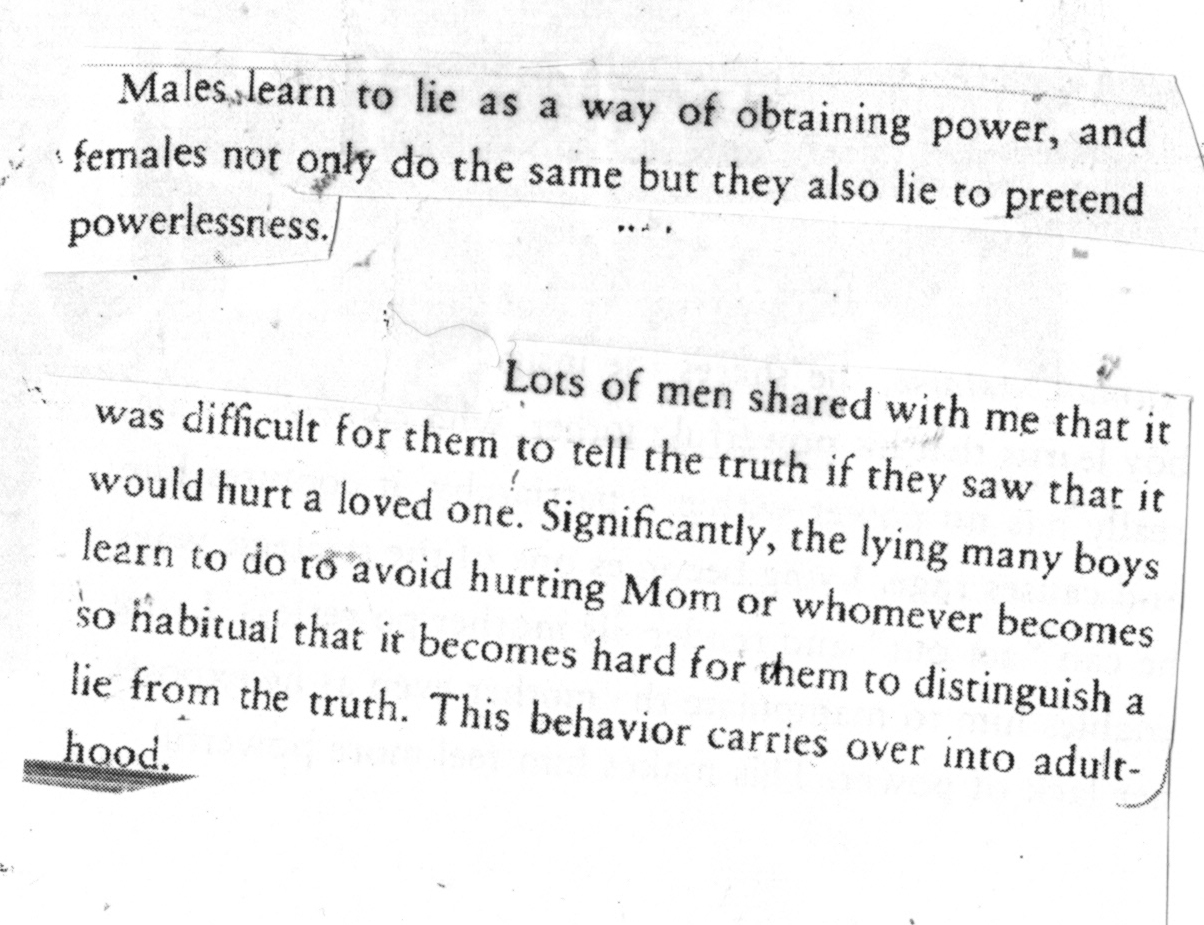 hooks (2017) p. 44
hooks (2017) p. 44
I think the problem is that the categories we are using are the categories of a world model that is already based on a lie. The world model in which we already have to say: "I love you, and trust me, it's true", and I'm not trying to hurt you. We already have to say what we feel and try to get away from the duplicity because we are haunted by lying. So, this paradigm, if you want to call it like this, by saying — it is a world of total honesty, and love — is that we can say things that in the world that we live right now, perhaps have no space, like for instance. I am intellectually more limited. I feel dumb: And I still want to learn, but I feel dumb and I feel limited', and everyone around will say, okay, you know, it's a world of transparency of knowledge. This would be what the world of honesty will allow us to feel comfortable with how we perceive ourselves, our limitations and also know that there is a space for that. And then we could deconstruct furthermore, rather than.[saying:] 'Oh yeah yeah I know all of this, oh yeah sure yeah I read all of this.' 'Mm-hmm. Yes, super interesting.' And then constructing these masks that allow us to coexist in a world that is a fake world, but also an extremely competitive world, because of the fakeness, because of the lie.
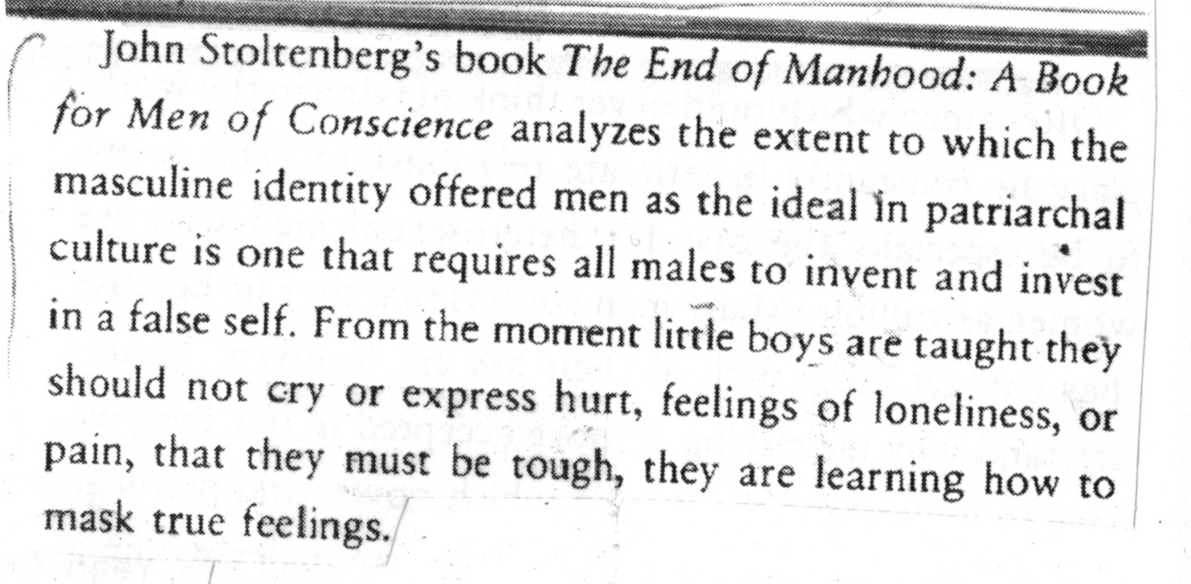 hooks (2017) p. 45
hooks (2017) p. 45
I relate a lot to this mask creating, ...she speaks about how it is the logic of Lie, of the logic of lies so necessary to patriarchy. And now, patriarchy functions. First, first or foremost, that I know, to use this word, but it works because it convinces small boys too, not to feel.
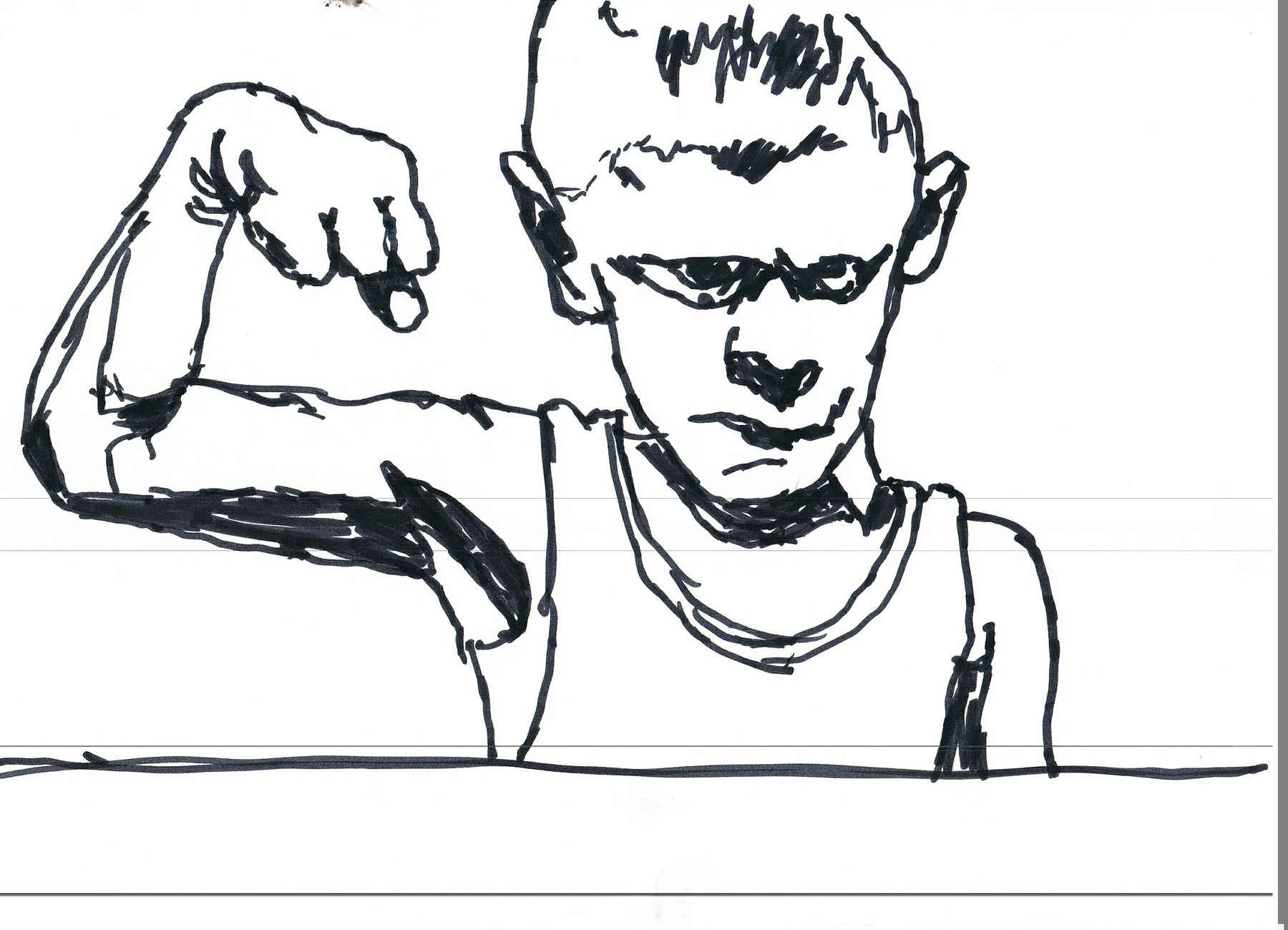 Drawing by Åke Sjöberg 2018
Drawing by Åke Sjöberg 2018
And I think it's really one of the projects of, within feminism that I really like, is the deconstruction of the heterosexual, not just the accusation of that heterosexual gaze, and the male gaze, but the understanding of how it's fabricated. And how we can take it away, how could we undo that. And I think that's really just interesting that she says something about that many men don't even know how to feel.
And because they don't know how to feel, they can't even understand what lying causes in the world, because it doesn't matter. So the book is also seeking so much about the important role of emotions. Something that sort of makes us protect others, and empathy and all of this.
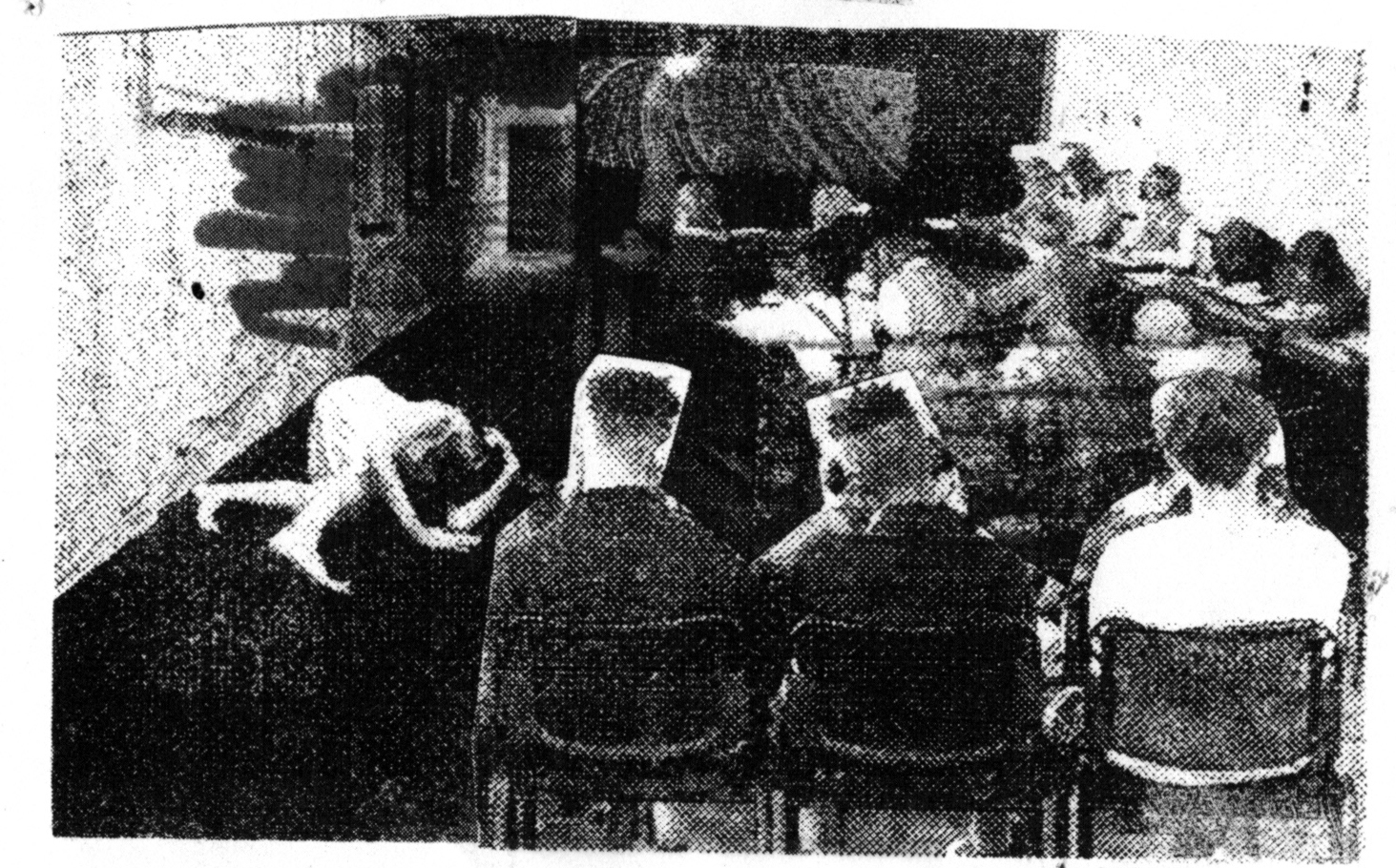 Collage by Åke Sjöberg 2021
Collage by Åke Sjöberg 2021
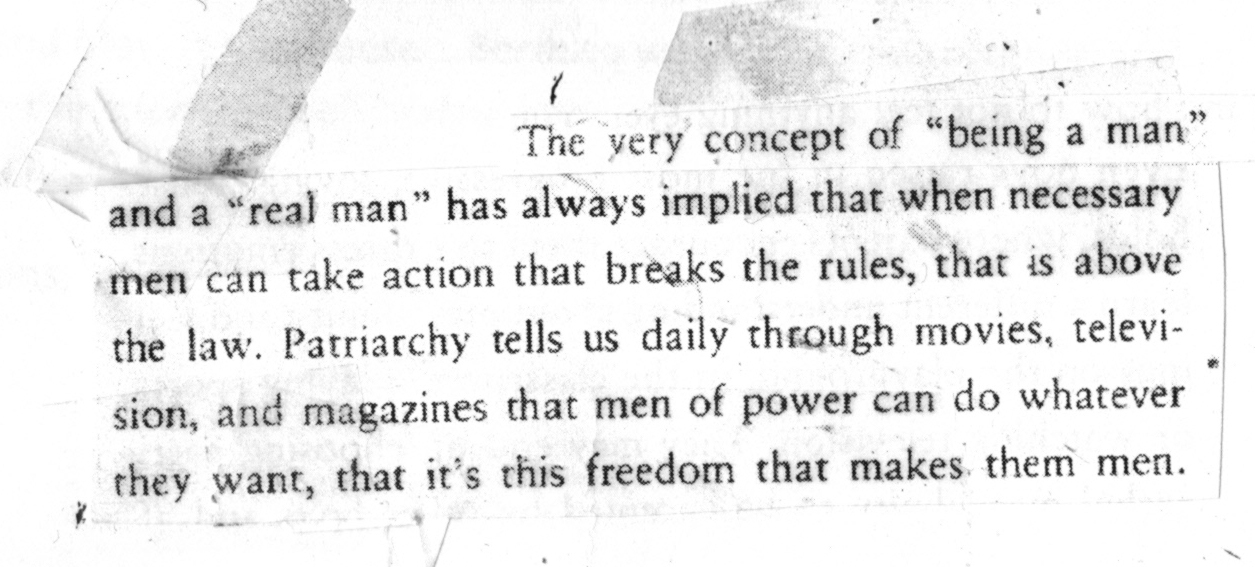 hooks (2017) p. 45
hooks (2017) p. 45
Some people only access their feelings, not by feeling them as you feel somewhere, but because it manifests in the body as anxiety or tension, or rage. So this is the vocabulary that many men will have if they are cut off from access to their feelings. Everything just becomes immediately rage, or whatever. Rage, towards themselves or the world.
And, I think this is quite interesting, it makes me think more and more, If what we need in the world is just an emotional education.
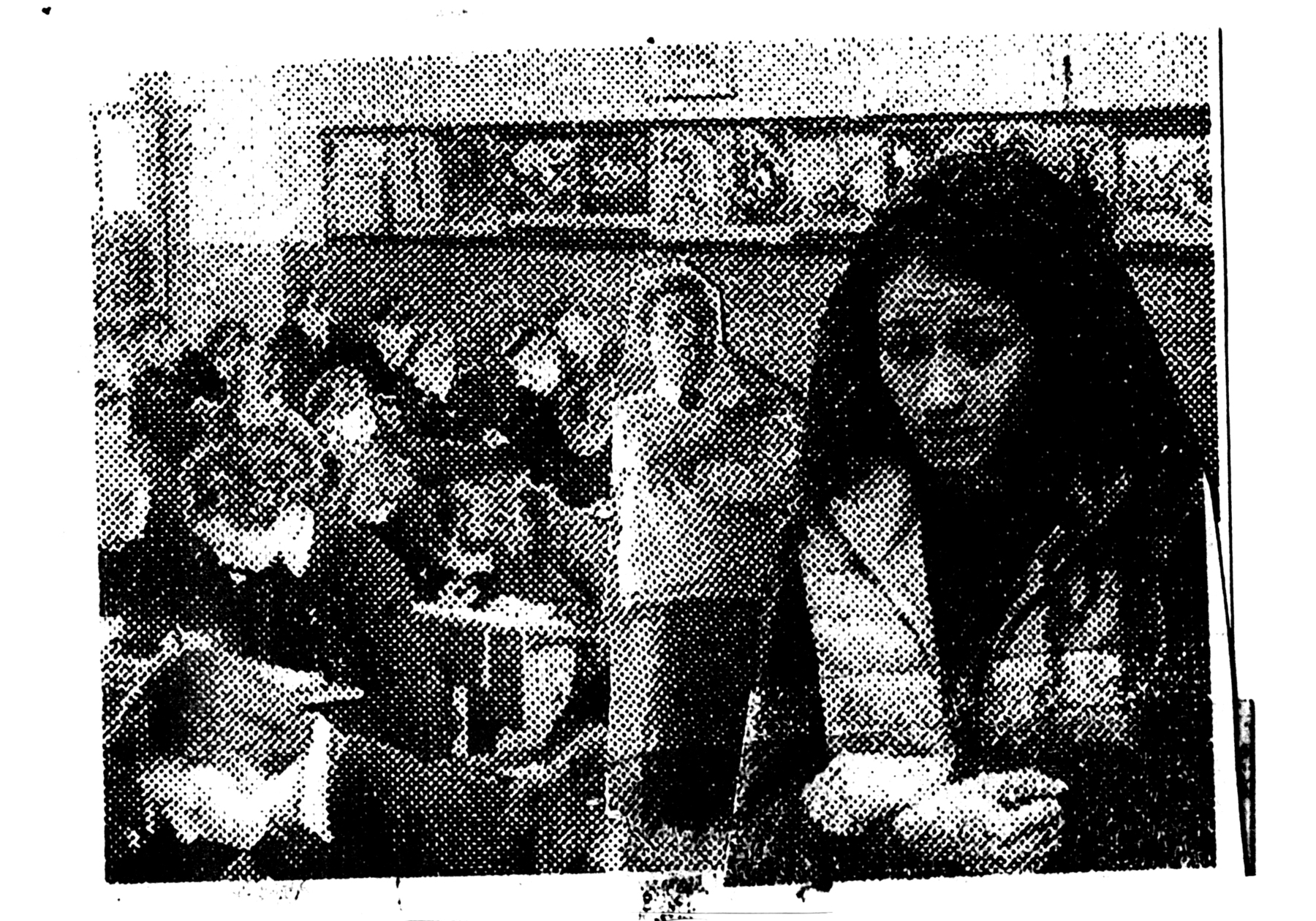 Collage by Åke Sjöberg 2021
Collage by Åke Sjöberg 2021
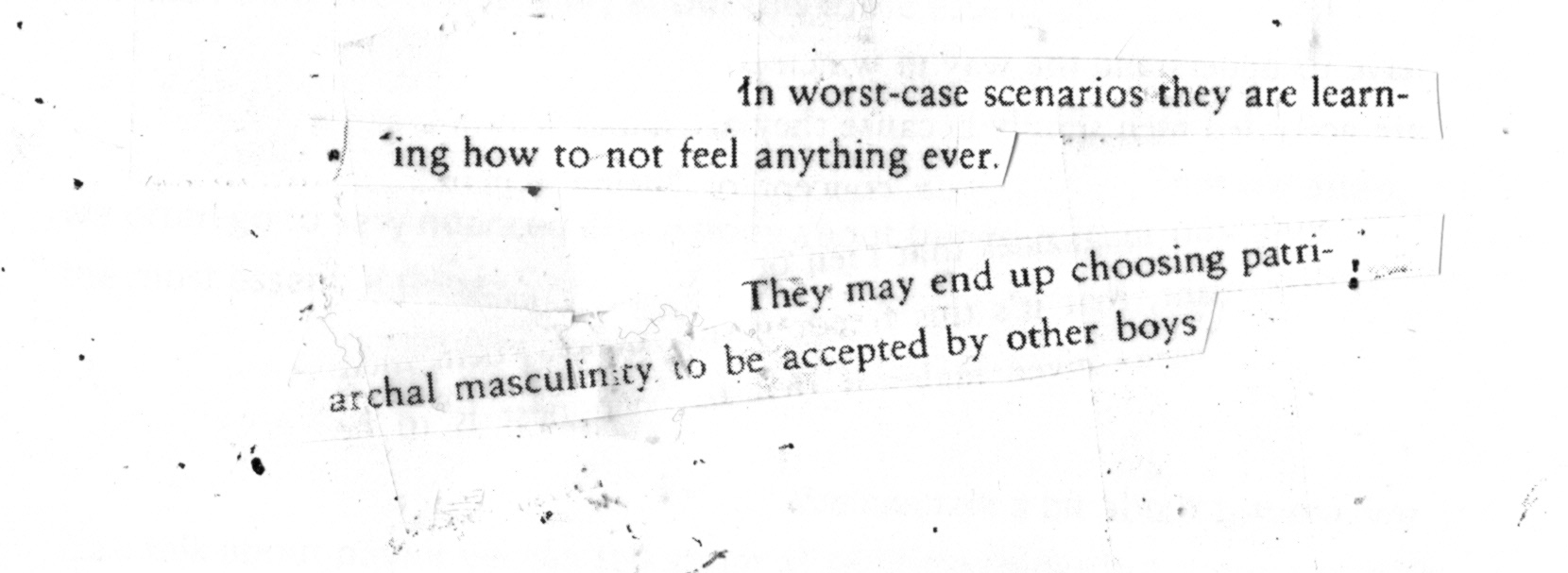 hooks (2017) p. 45
hooks (2017) p. 45
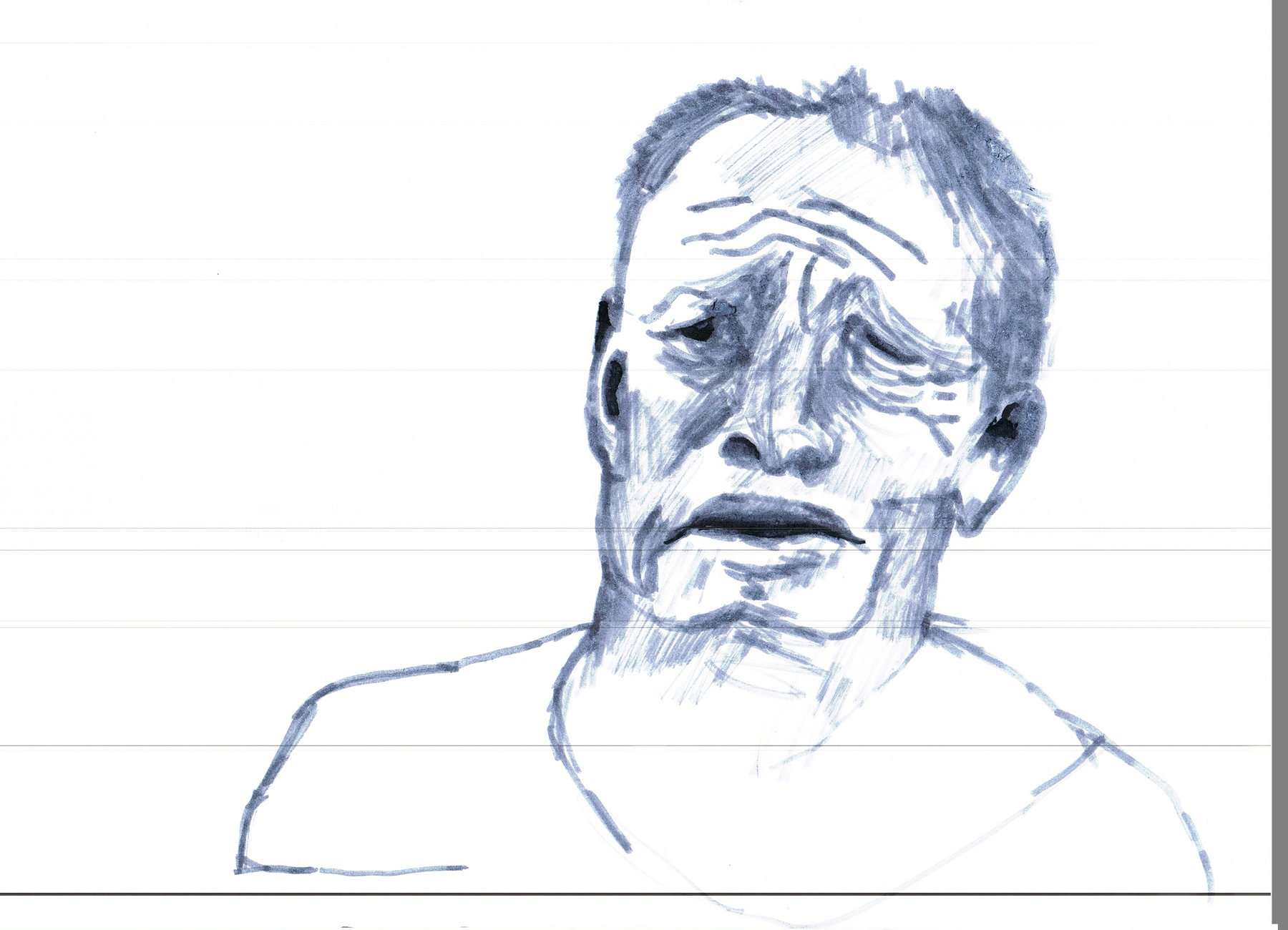 Drawing by Åke Sjöberg 2018
Drawing by Åke Sjöberg 2018
Intermezzo 1
The classroom as a loving community?
Honest, be true to love... 2
 Hardy, Easton (2017) p. 88
Hardy, Easton (2017) p. 88
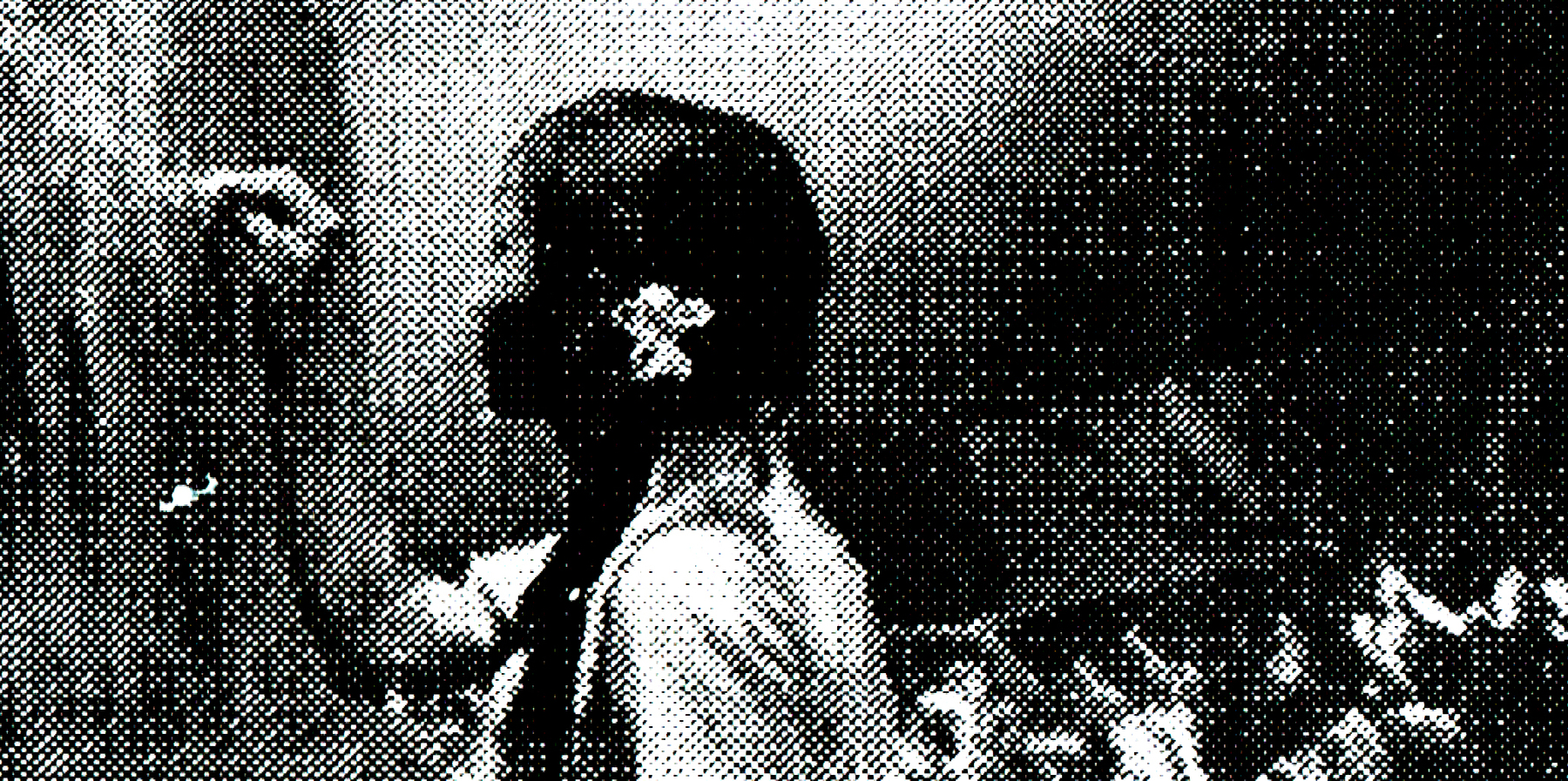 Collage by Åke Sjöberg 2021
Collage by Åke Sjöberg 2021
 Hardy, Easton (2017) p. 88
Hardy, Easton (2017) p. 88
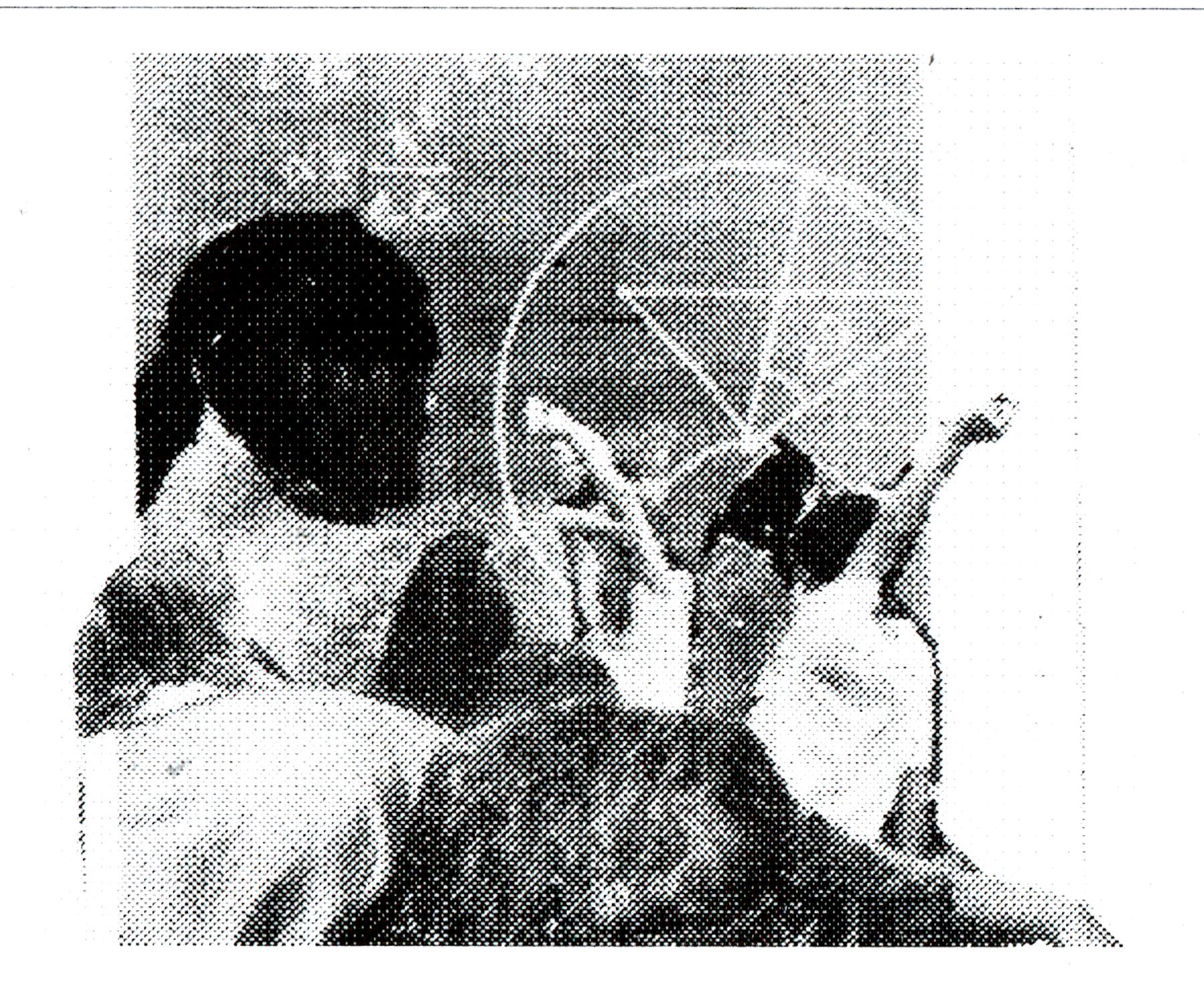 Collage by Åke Sjöberg 2021
Collage by Åke Sjöberg 2021
 Hardy, Easton (2017) p. 88
Hardy, Easton (2017) p. 88
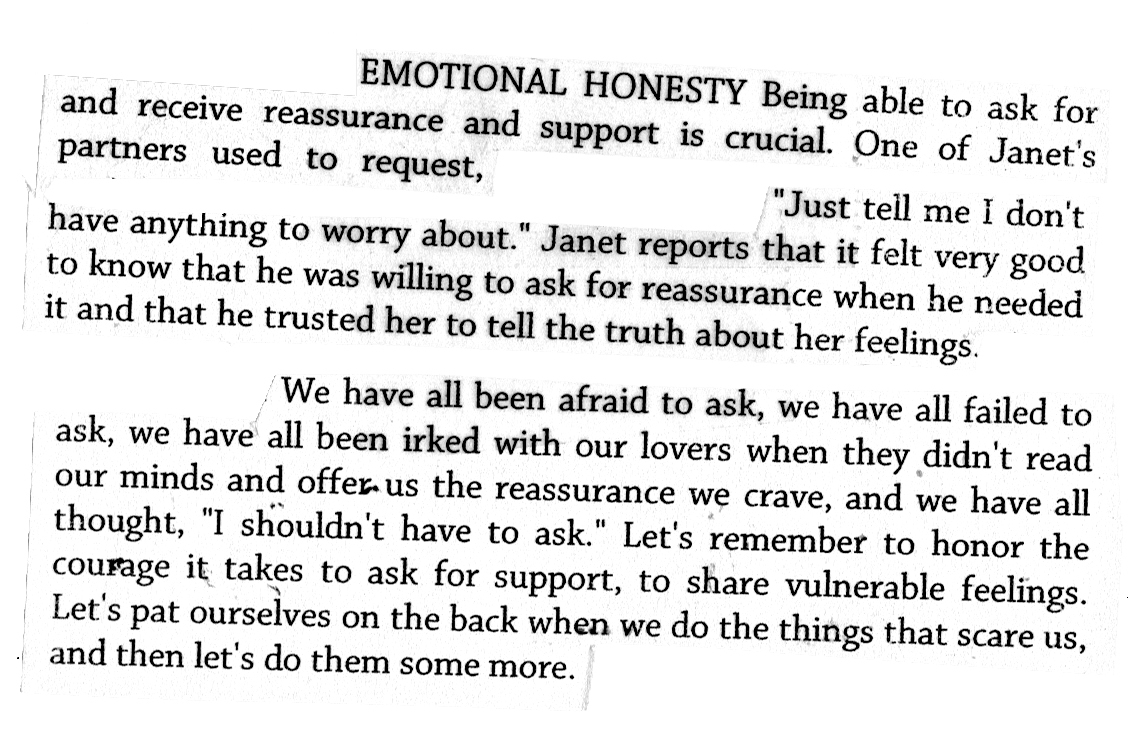 Hardy, Easton (2017) p. 84
Hardy, Easton (2017) p. 84
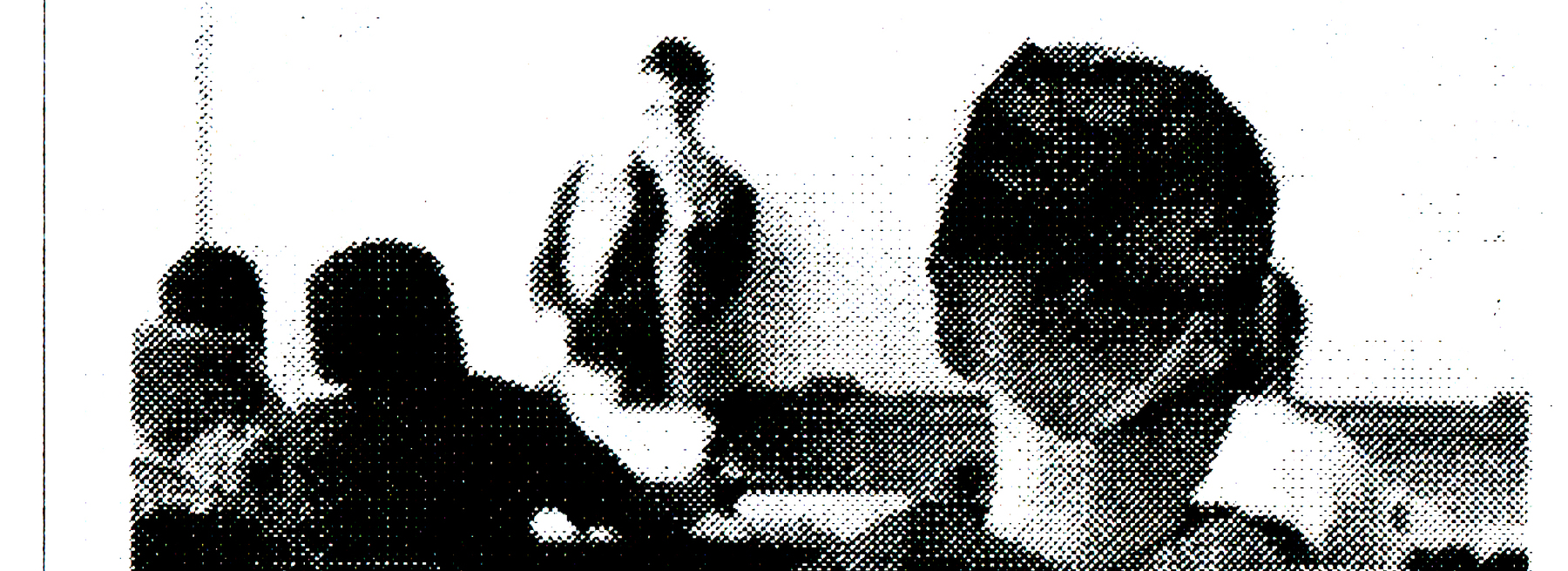 Collage by Åke Sjöberg 2021
Collage by Åke Sjöberg 2021
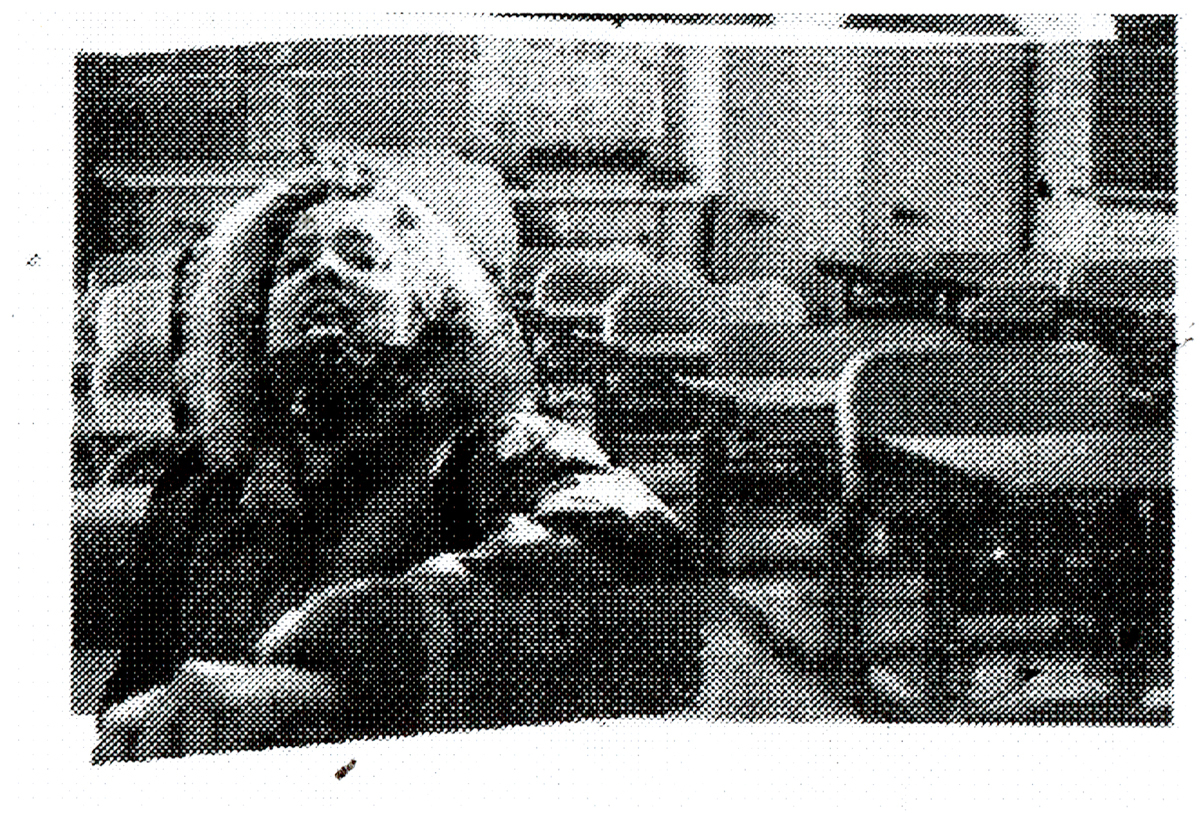 Collage by Åke Sjöberg 2021
Collage by Åke Sjöberg 2021
Group conversation, part 2
Group 1: Åke, Nino, Caro and Inga
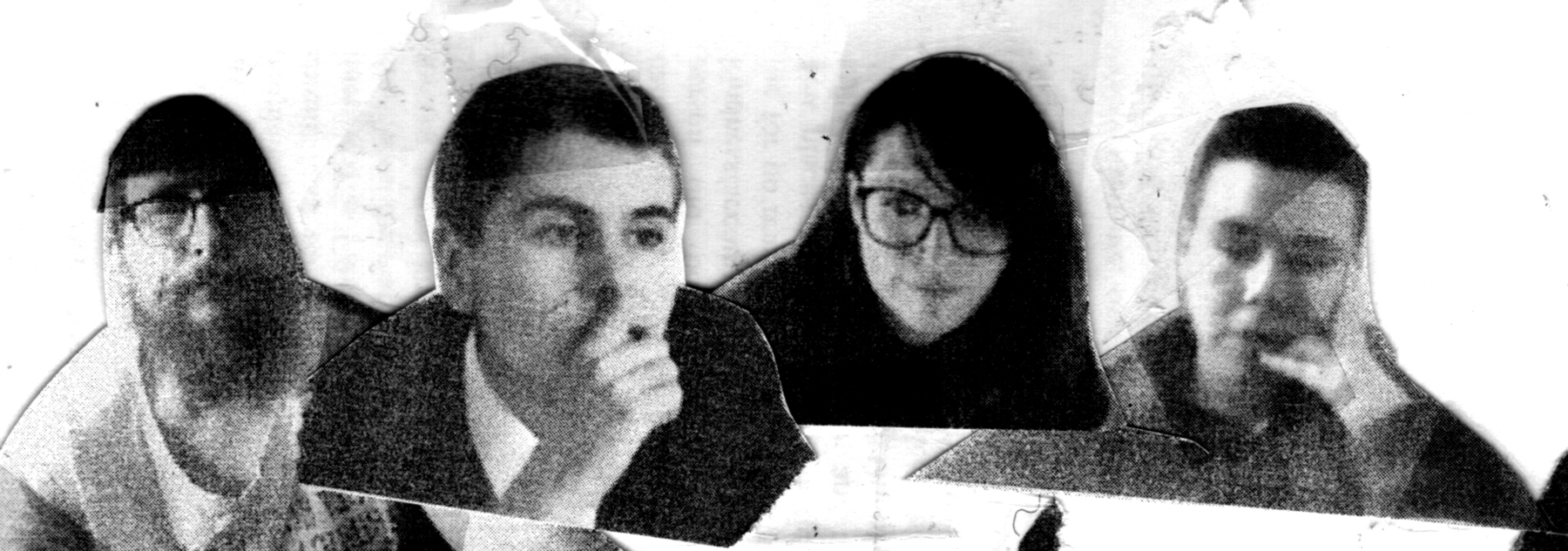 Collage by Åke Sjöberg 2021
Collage by Åke Sjöberg 2021
What do we want to say about it?
I just wanted to say in relation to your point that you mentioned before, that they were talking about the traditional socialization of behaving, according to the two genders, within the binary construct. And I feel like that really relates also to the division of labour. Based on this socialization and how people take on more labour or feel more comfortable about not participating in the labour etc. So, I just want to say thanks for bringing it up.
I think it was a great nice thing to read together.
I just noticed. I was saying: it was relevant in the context of academia or overall where this structure is in place. Lying is maybe part of the job, as it is now. And it's really interesting to link. There is something very personal in the intimate life, but you can compare it to institutional structure, and it's really thank you really for the text.
You're welcome.
 Collage by Åke Sjöberg 2021
Collage by Åke Sjöberg 2021
I think it's also interesting to focus on the act of lying because I've never paid that much attention to it, myself, on this nuanced and subtle level. Because I think a lot of times, telling these small lies, to get away with something, or to not do something.
I was wondering about telling the truth. I have the feeling that telling the truth in the context of an academic institution, also could be very emotional. I think it's linked to the discussion the other day, if you put some feelings and emotions in the classroom, it could shift and change everything.
 hooks (2017) p. 44
hooks (2017) p. 44
Where to put love and where to put lies?
Once in a workshop I was forced to hug someone. And this made me super stressed and triggered. And I think at this moment I would be able to tell the truth, and say no, I can't lie and say, I'm okay because I'm not.
How can we lie, and how can we contaminate institutions, these structures that most professional organisations and schools and so on? They are as they believe created for a particular kind of person. And sort of a 'normal'. And it's a form of relating to a 'normal’ person or a typical person. And if you are not fitting within this norm. It is, it is quite usual that you... this normal way of being triggers also things, emotions, and so on. But they. It is also kind of put it's shame, sort of shame, too because you're not supposed to show your emotions. So then it becomes also okay: 'I get emotions, but I have to lie about it because (as she said in the text) I don't want to be seen as a freak'.
And the other thing I just wanted to say was, also because I am not so good at reading, I often come to school to sort of. 'Oh yeah, have you read this text now we're gonna talk about it?' and I'm like, not saying anything. So I'm lying by withholding information, and this is why I want this workshop to be like, 'okay we read together so we don't have to lie about, okay yeah I have read it', of course, or just like, silent.
 hooks (2017) p. 45
hooks (2017) p. 45
I was also thinking it's always a question about context. Because telling the truth and be very emotional, with the group. At the end of the week of January. It's quite fine and it's really okay and so on. And we were talking about this with Laurence, and talking about when you arrive to upon that you are crying in the room. And she said, Yes, but of course in this in our context. It's totally okay. But, for example, as a principal, she trained herself to never cry in big meetings with a hierarchy. Because it's a sign of weakness and immediately after she will be treated as weak or as a hysteric girl. So, it's like: always telling the truth, and being emotional, is a question of context, and trust the people, more or less, who are in the space.
When you're alone in front of a lot of people, isolated. But if you're not isolated It's different, but when we are alone It's really difficult.
I think it's linked to feminine behaviour or childish behaviour like you're not major like if you don't leave your emotion. And I think that there are emotional laws like being upset, if you are men or in a position of power. Oh yeah. Sometimes I'm just like, wait, wait. Like, we have to play with this rule.
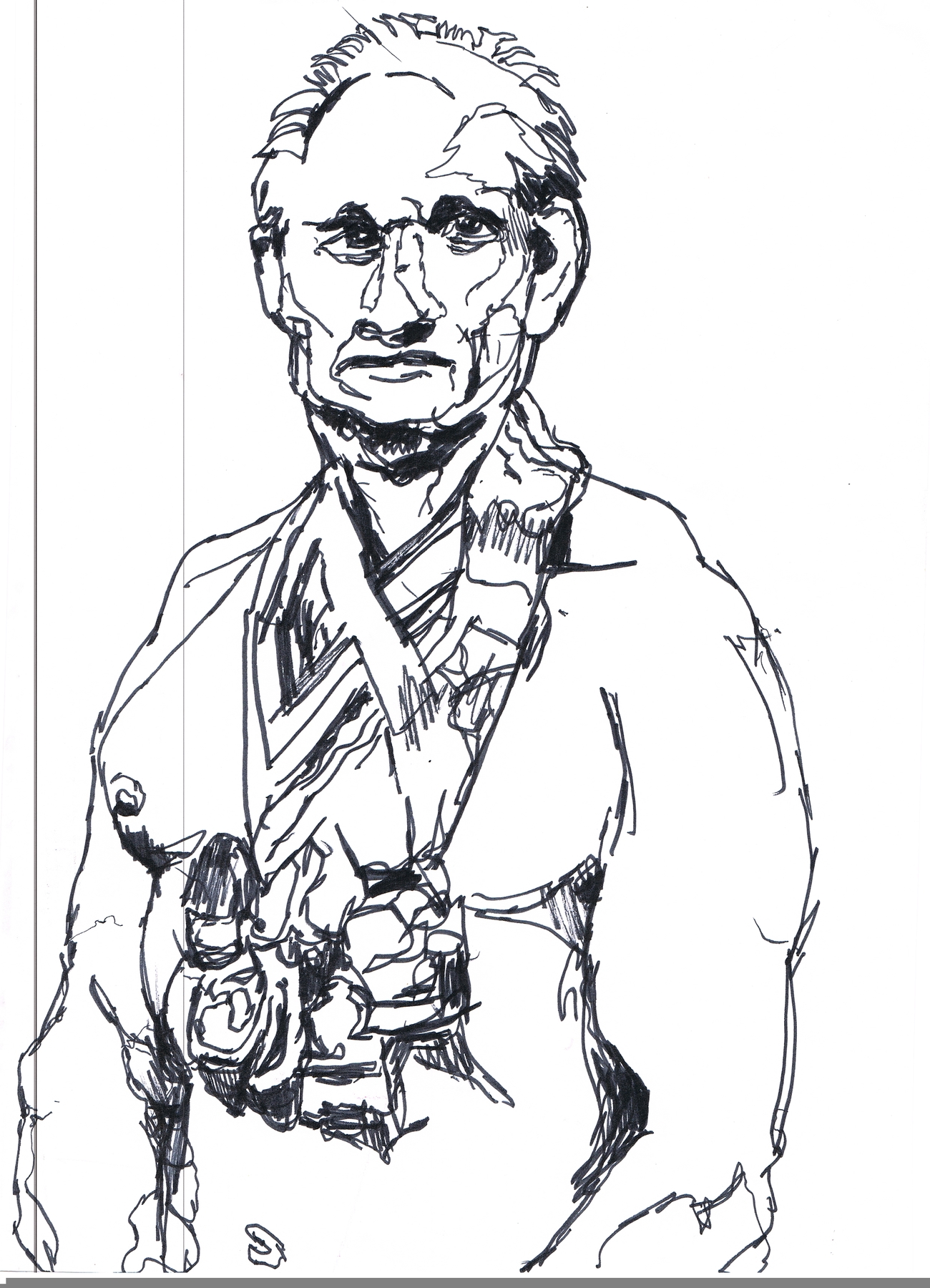 Drawing by Åke Sjöberg 2018
Drawing by Åke Sjöberg 2018
 hooks (2017) p. 45
hooks (2017) p. 45
We need tools if we are isolated. If it's difficult to change this context, we need tools, and this text is one tool, a good tool, to have a lecture together, it changes, automatically the contexts.
Absolutely I think it's also important to try to implement them. Like, who has the power to start moving the, or like to start changing these things, in the classroom. And who are you, what are you then encouraging for future people that will be in rules of power that might allow such behaviours to be seen as a strength, seen as valid, emotional behaviour in any kind of certain situation.
Intermezzo 2
The intended Intellectual Outputs of this research group is a mash-up of two different original Outputs's:Emotions in the classroom and Conflicts: How to talk to people we don't agree with?
During the process of two years the group went through the Covid 19 Pandemic, and 3 of the planned 4 workshops were cancelled, and a long term distance collaboration was used for this work. And our group lost two really intelligent and driven group members.
During our conversations about the topic of emotions and conflicts I use a lot of thinking tools that I can not place in any theory I have read. But then all of the sudden it came to me, that I get a lot of the concepts from a book I read about 10- 15 years ago, and it was influential on my thinking. The book was The Ethical Slut.
Keeping non-monogamous relationships working involves a lot of communication skills, self-awareness and conflict-resolving. I include some clippings from the book in this collage. Can we learn conflict management from the partners in non-monogamy and apply it to our classmates, students, peers, colleagues or partners in the classroom or workplace?
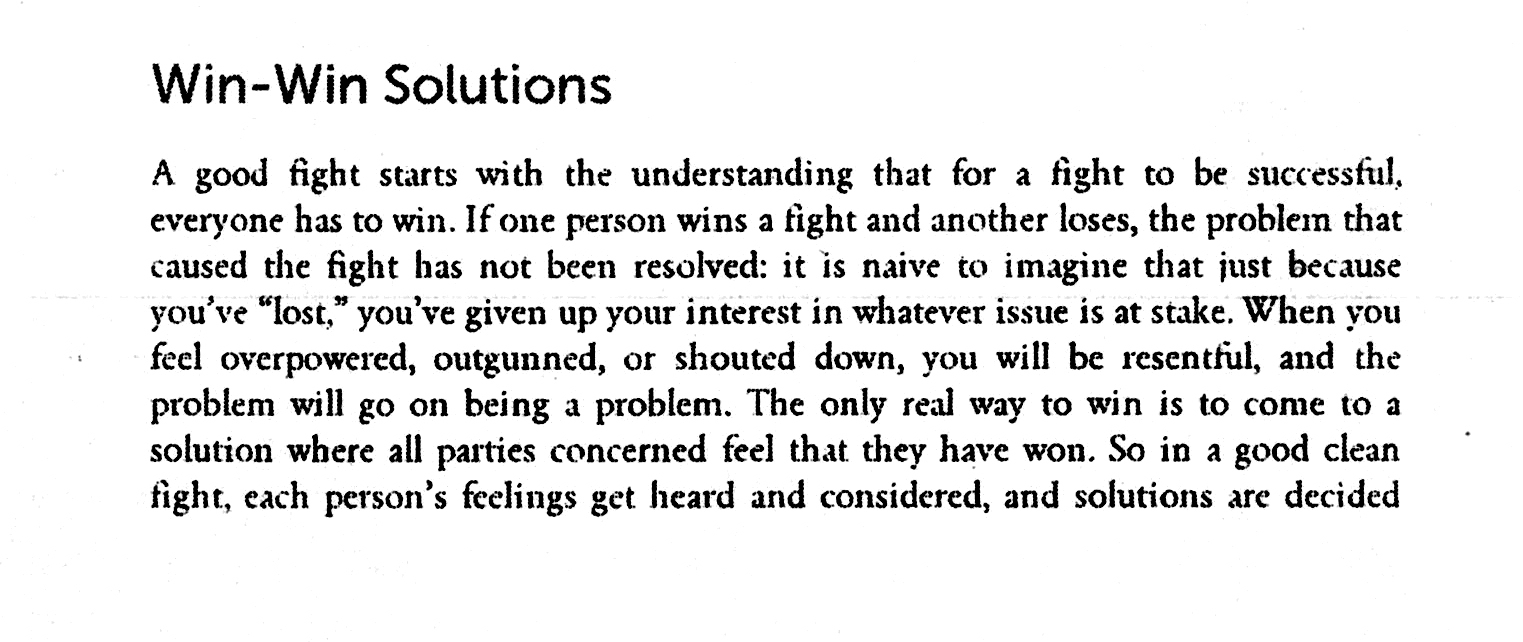 Hardy, Easton (2017) p. 151
Hardy, Easton (2017) p. 151
Group conversation part 3
Debrief. Group one and two
Okay, so is everybody here now? What did you talk about?
We talked a bit about what emotions are, and what emotions are linked to honesty, that sometimes, because we have lied because we are in a structure that is created after a form of rational and masculine way of being, then the emotional parts are seen as more like feminine or, childish, or it's not the way you're supposed to be, in this kind of environment, as in an academy.
And another thing I remember is. Yeah, when, when is the right time to be honest. And what, when is it actually bad for you to be honest. And I think that also related quite a lot to the, I don't know if all of you were in the conflict workshop, but when it was they, talked about it.
Like sometimes it might be. Yeah, if you're in a board meeting with the important sponsor or something like this or with the politician, then maybe you have to be very, very strict, to show that, 'okay. I'm trustworthy in this kind of environment'.
Then we can go over to group two, what did you find?
I've written so many things that like saying something or because of my notes are very dissimilarly, like very scattered. I can try.
Maybe if you have something, to begin with.
I don't, honestly... I think we can allow ourselves to be scattered because we also were scattered in our conversation, so it's good.
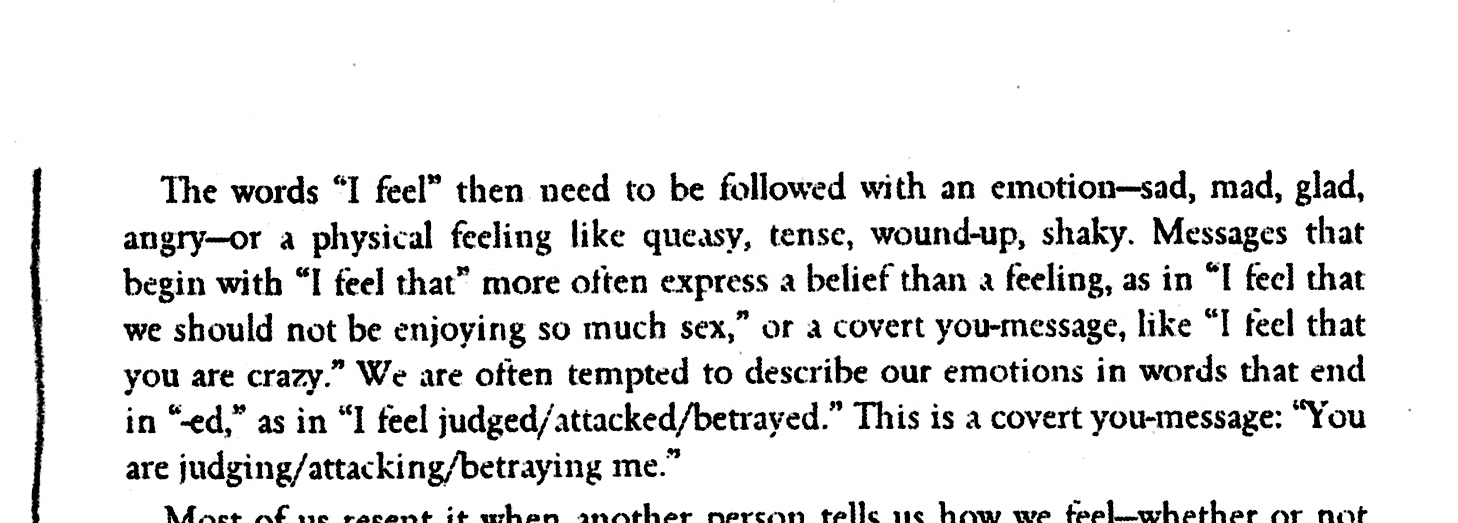 Hardy, Easton (2017) p. 156
Hardy, Easton (2017) p. 156
We talked about the fact that there is a difference between secrecy, as intimacy and my life between the four walls, let's say. And the fact that I feel like hiding my feelings from others. For me, like the kind of need the difference between those two things, just André, if you can help precise things?
Yes, I can help. I think we talked about the differences between hiding something, between secrecy and privacy, and secrecy was about power, and also being afraid of the reactions of other people, when being honest and private was just living one's own life, and doing stuff.
We also talked about, the notion of trust, like the fact that when we tell the truth, it's not to hurt people, that we also need to trust the person to say the truth. Precisely because we talked about, if you are in a scene and large relationship you should trust the person in front of you not to want to hurt you. When you're telling the truth, as a gift.
The truth as a gift.
If we have a principle of honesty, as a base, as a basic thing, then all the other kinds of relationships of power of fear and all that, they dissolve. Because we take what is being given to us, we don't, we will take that in as a gift and not as something that has another agenda, as another intention, to dominate you.
Giving and receiving trust like gifts,
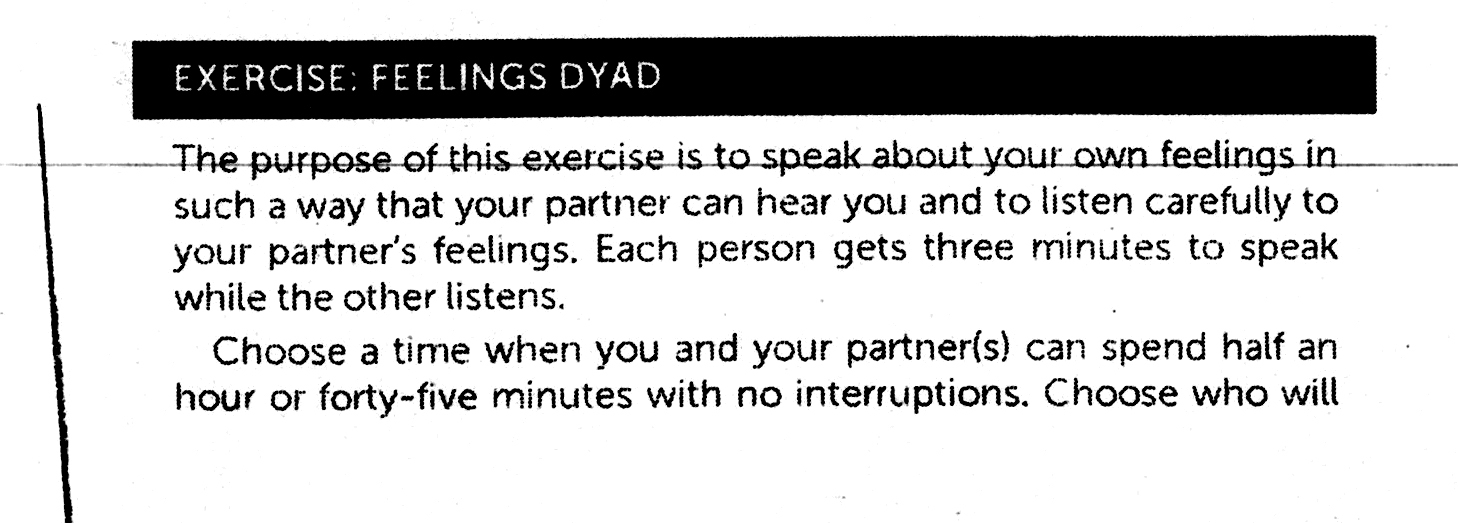 Hardy, Easton (2017) p. 156
Hardy, Easton (2017) p. 156
This question that you were making was important about this note, though it's easy to say, it's hard to get there right, this much of our conversation like, this is nice like as a principle, but how can we go from this to this kind of proposition, where the entire structure we inhabit this space, precisely on the denial of dishonesty.
 Hardy, Easton (2017) p. 157
Hardy, Easton (2017) p. 157
We also talked about the construction of masks, and how it's linked with societal norms, not only the concept of masks but also the feeling of wearing a mask.
Sometimes, in a group, when you’re not expressing the feeling that you're feeling, the group can feel it. you don't say the words ‘anger’ or ‘fear’, but then the group does feel.
Like the group is "living the emotions".
 Page 15 from the booklet Sjöberg 2020 made with hooks (2017) p. 51
Page 15 from the booklet Sjöberg 2020 made with hooks (2017) p. 51
Yeah, I wrote first in the presentation, in the first version of the introduction I wrote that: "you might bring an elephant into the room, and it might accidentally sit on someone".
Accidentally do what?
If you bring an elephant into the room, the elephant might accidentally sit on someone, and hurt them. So it's good, if you bring an elephant into the room, to inform people about it, so they can be aware of it. In a way, it's similar to what you were saying.
Yeah, it's a great image.
Okay. I think it's time to wrap it up, because there is another workshop, starting now. Let's see. Yes. 'Who is the classroom'. Yes, but if you have the possibility to fill in the feedback sheet will be very, very happy. And thank you very much for this, it's been very nice.
Thank you.
Thank you.
Great. Thank you.
After thoughts
Now more than a year has pasted since the events of this text happened. What is still important? What tools (if any) are this text-collage presenting? Is there a need to describe what this collage says? Can this collage be presented as a tool?
These are some of the questions going through my head, some words that could summarise this collage might be:
- Be honest.
- Be nice to other people.
- Be open.
But then Again, you tell me. Did reading this collage give you anything? And if so,
please hit the like button,
and subscribe to my channel
and write a comment in the comments field below- Be brave.
and please consider becoming a patreon,
so I can continue making these great videos- But as the slogan of 2020 goes “stay safe”.
- But in what spaces is honesty safe?
- But in what situations is it productive to disclose what is going on inside you, to revile your emotions?
- Does radical emotional honesty only work in a “safe space”, or is it a tool to produce a “safe space”?
- Is radical emotional honesty more about bravery, and is revealing your emotions an active part of creating a “brave space”?
- “Radical emotional honesty” build on the understanding that we can benefit from emotional bonds also in professional collaborations, that shared emotions and putting words on emotions and atmospheres can be helpful in “team building”, in creating a feeling of a “we”. And that the model of being rational and not personal in professional settings is a remanence of the time when workspace and university was a male separatist space.
- In a conflict, try to communicate what you feel. Don't jump directly to creating a solution.
- Don't blame anyone else for your feelings, own them. But feel free to describe what you feel in a particular situation, without attaching it to a specific agenda.
- If someone “breaks” into tears, rage or other emotional state, don't be afraid, try to use this event to build emotional bonds and learn about feelings
Created by the TTTT organisation using open source software and creative commons image materials.
Transcription, Images, text, collageing and curation by Åke Sjöberg.
Great thanks to the participants of the workshop:
Aroun, Zoya, André, Inga, Caro and Nino.
You made this.
References & Resources
Click to go to books in shadow-library
- Brad Blanton, Radical Honesty*, Dell, 7th ed. 1996
- Janet W. Hardy and Dossie Easton, The Ethical Slut*, Ten Speed Press, 3rd ed., 2017
- bell hooks, All about Love*, HarperCollins, 2018
- Collaged booklet/zine version of chapter 3 Link to the zine booklet two language french enlish
- Sarah Schulman, Conflict Is Not Abuse*, Arsenal Pulp Press, 2016
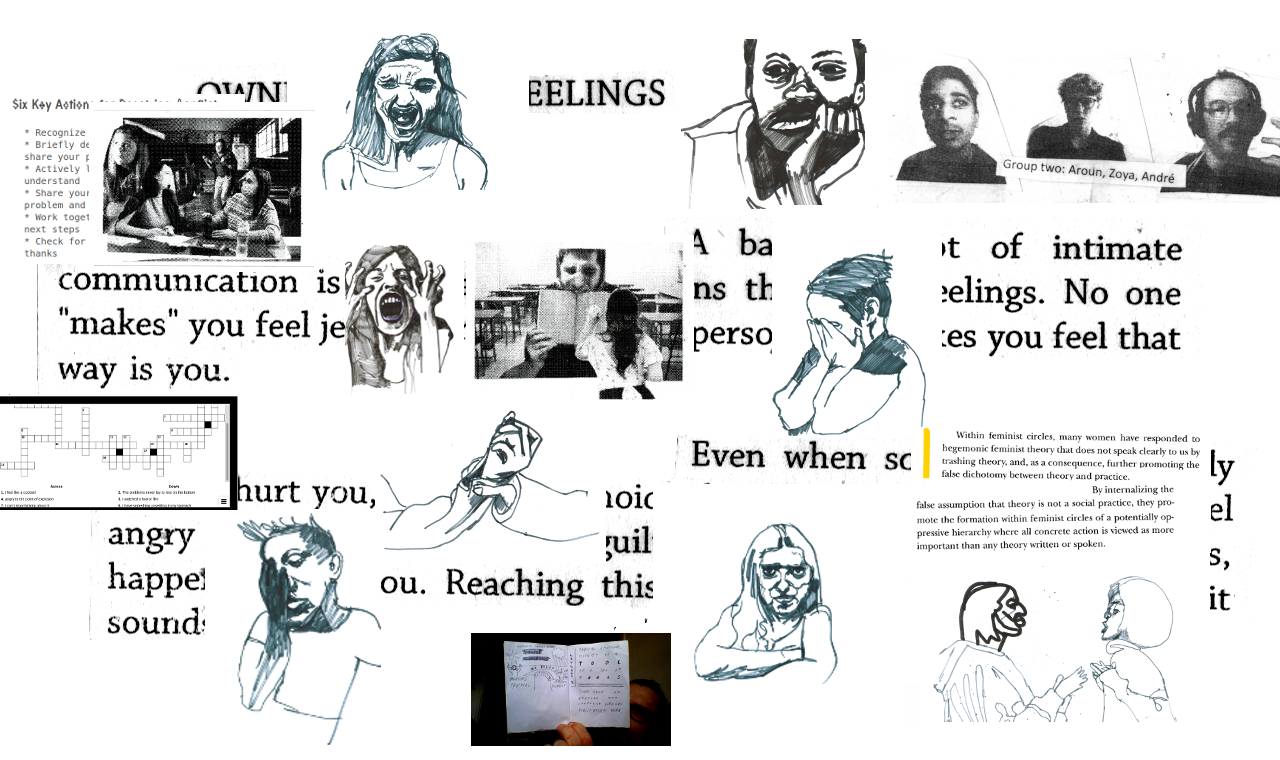 An invitation to meander through an inquiry on nonviolent communication, conflict resolution made of collages, drawings, references, readings and personal or collective experiences by Åke Sjöberg
An invitation to meander through an inquiry on nonviolent communication, conflict resolution made of collages, drawings, references, readings and personal or collective experiences by Åke Sjöberg
References and Workshops: Nonviolent Communication and Conflict Resolution
References and Workshops: Nonviolent Communication and Conflict Resolution
Diary: Radical Emotional Honesty as a Feminist Tool
Collage: NonViolent Communication, Conflict Resolution and Mediation
Samples: NonViolent Communication Crossword Puzzles
-
This relates to the history of feminist struggle in relation to the divide of the private coded female space of the home, the love-relations and so on , and the masculine coded public sphere of the workplace, schools and the city in general in mind. I will shortly mention three parts of struggle, first the radical feminist of the 1960-70s “second wave”, women leaving their house-wife roles, going into all masculine coded workplaces, in the fight for gender equality. -Secondly CR, (Consciousness Racing), another method used by the second wave feminists, to meet and collectively speak about what happened in the “private life” of the individual women, and thereby be able to see patterns between the different women's similar experiences. -And the third, regards the lingering ban of emotions we have today, that make up part of the unwritten laws and rules of conduct in spaces such as classrooms, and meetings all within the public sphere. ↩
-
hooks (2017) p. 45 ↩
